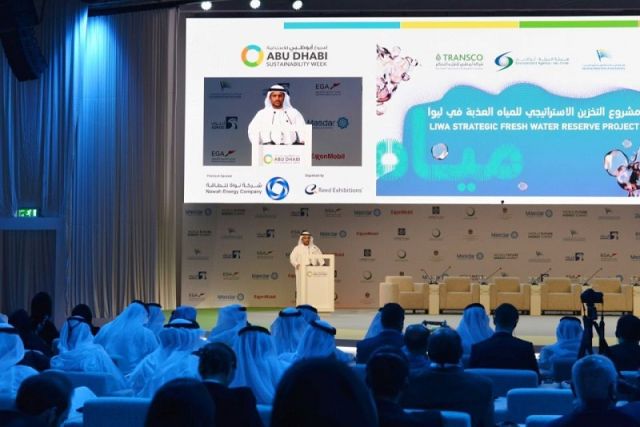
by admin | May 25, 2021 | Muslim World
 Abu Dhabi : The United Arab Emirates on Monday unveiled the world’s largest reserve of high quality desalinated water, secured in a network of 315 recovery wells lying up to 80 meters below the Liwa Desert in Abu Dhabi, Arabian Business reported.
Abu Dhabi : The United Arab Emirates on Monday unveiled the world’s largest reserve of high quality desalinated water, secured in a network of 315 recovery wells lying up to 80 meters below the Liwa Desert in Abu Dhabi, Arabian Business reported.
The wells are fed by one of the UAE’s longest water pipeline networks which runs the water from Shuweihat desalination plant at a rate of 7 million imperial gallons per day over 27 months.
The reserve, which has at its core an infiltration and recovery system sitting atop a natural freshwater underground aquifer, was first investigated in 2002 and has been extensively researched by the Environment Agency of Abu Dhabi (EAD), a statement said.
Established in one of the world’s driest areas where rainfall rarely exceeds 10cm a year, the project has been completed at an estimated cost of AED1.61 billion ($435.6 million) to deliver a fallback pumping capacity of 100 million gallons of water per day to the emirate if required.
The project ensures continuous water supply for Abu Dhabi city and Al Dhafra region and secures the reserve for future generations. The reserve now holds more than 26 million cubic meters of water that can bolster drinking water supply when needed.
The Liwa Desert was chosen for the project after it met strict specification criteria. Water quality is ensured through strict control, heat and salinity monitoring equipment and a range of other metrics.
—AB/UNA-OIC
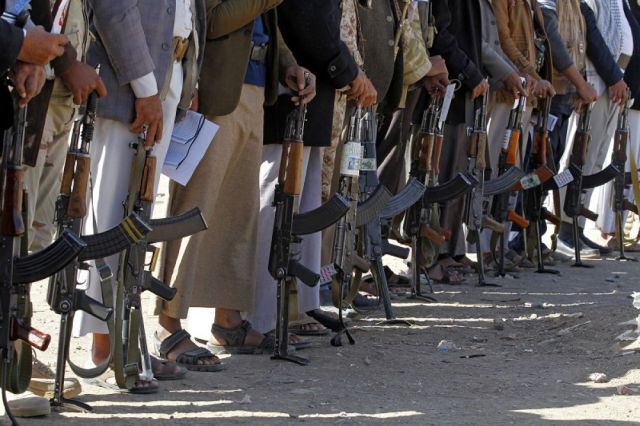
by admin | May 25, 2021 | World
 Copenhagen : The Norwegian government on Wednesday announced that it would no longer be selling arms to the UAE as they were possibly being used in the war in Yemen.
Copenhagen : The Norwegian government on Wednesday announced that it would no longer be selling arms to the UAE as they were possibly being used in the war in Yemen.
The UAE has been fighting in Yemen as part of the Saudi Arabia-led coalition.
Norway’s Foreign Affairs Ministry said in a statement that there was a growing risk linked to the UAE’s military participation in the war but insisted that there was no evidence that Norwegian weapons had been used in Yemen, meaning the suspension was a preventative measure, Efe news reported.
“The development of the armed conflict in Yemen in the autumn of 2017 has been serious and there is great concern about the humanitarian situation,” the statement said.
In 2016, Norway sold arms and ammunition to the UAE for 100 million kroner ($12.3 million).
Saudi Arabia, which is excluded from Norwegian weapons exports, leads a coalition alongside the UAE that has since 2015 led a bombing campaign against Houthi rebels and backed President Abdrabbuh Mansur Hadi, who is exiled in Riyadh.
The World Health Organization, Unicef and the World Food Programme recently said that the conflict in Yemen had become a humanitarian crisis and around 75 percent of the population was in need of help.
—IANS
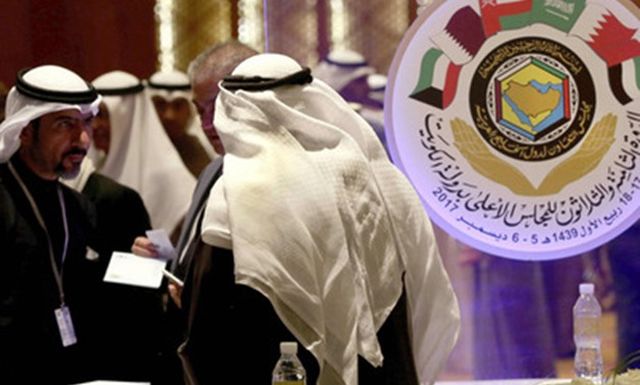
by admin | May 25, 2021 | Business Summit, Events, Muslim World, Social Round-up
 Kuwait : The 38th annual summit of the Gulf Arab heads of state will convene here on Tuesday and Wednesday, officials said, despite an ongoing dispute between some members of the group.
Kuwait : The 38th annual summit of the Gulf Arab heads of state will convene here on Tuesday and Wednesday, officials said, despite an ongoing dispute between some members of the group.
A rift between the Gulf Cooperation Council members Saudi Arabia, Bahrain and the United Arab Emirates (UAE), on one side, and Qatar on the other has put this year’s annual meeting in doubt, Al Arabiya reported.
The crisis, which began in June, revolves around allegations by Saudi Arabia, the UAE, Bahrain and Egypt that Qatar supports terrorism, a charge Doha denies. Qatar says the four countries were trying to force Doha to fall in line with their own foreign policy views.
Qatar’s Foreign Minister Sheikh Mohammed bin Abdulrahman al-Thani met his Gulf Arab counterparts on Monday ahead of the summit, one of the highest official encounters since some of them cut diplomatic, trade and travel links with Doha.
Al-Thani said that Qatari Emir Sheikh Tamim bin Hamad al-Thani would attend the six-nation Gulf Cooperation Council (GCC) meeting, despite the dispute within the group.
—IANS
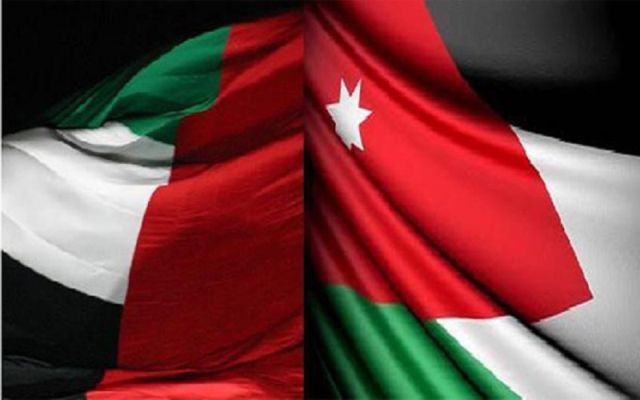
by admin | May 25, 2021 | Muslim World
 Amman : Jordan and the United Arab Emirates (UAE) on Tuesday signed 12 documents, including agreements, protocols, memoranda of understanding and executive programs, which would further boost cooperation between the two countries.
Amman : Jordan and the United Arab Emirates (UAE) on Tuesday signed 12 documents, including agreements, protocols, memoranda of understanding and executive programs, which would further boost cooperation between the two countries.
The deals were signed following the 3rd session’s meeting of the Jordanian-UAE joint ministerial committee, which was chaired by Minister of Foreign and Expatriates Affairs Ayman Safadi, and UAE Minister of Foreign Affairs and International Cooperation Sheikh Abdullah bin Zayed Al Nahyan.
Also, the deals covered the fields of financial and technical cooperation, communications, Information technology, electronic power, environment, trade, investments, maritime cooperation, education, higher education and scientific research and media.
Safadi commended as “historic” and “deep-rooted” the relations between Jordan and the UAE and voiced appreciation for the UAE support to the Kingdom.
He said the UAE is Jordan’s strategic partner and bilateral relations are witnessing continuous development in various fields as both countries see eye-to-eye on Arab, Islamic and human issues.
Sheikh Abdullah bin Zayed said his country appreciates Jordan’s burdens since the beginning of the last century as well as the Kingdom’s efforts to defend the Al-Aqsa Mosque.
He stressed the importance of continuing joint bilateral action and creating new frameworks and dimensions for cooperation and coordination.
In a meeting, both ministers discussed regional developments, including the Palestinian issue and efforts to solve the conflict according to the two-state solution as well as fighting terrorism.
The 3-day session addressed ways to promote and develop relations between the two countries in all fields, with an active participation of the private sectors in both countries.
—SM/OIC-UNA
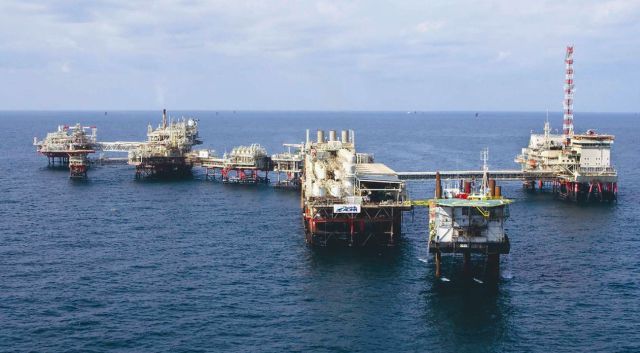
by admin | May 25, 2021 | Muslim World
 Dubai : United Arab Emirates (UAE) Minister of Energy Suhail Al-Mazrouei said on Sunday UAE is to cut oil production by 139,000 barrels per day in November in line with an Organisation of Petroleum Exporting Countries (OPEC) decision.
Dubai : United Arab Emirates (UAE) Minister of Energy Suhail Al-Mazrouei said on Sunday UAE is to cut oil production by 139,000 barrels per day in November in line with an Organisation of Petroleum Exporting Countries (OPEC) decision.
The state-owned company Abu Dhabi National Oil Company (ADNOC) has decided to cut its production for November, reflecting the country’s commitment to its share of the reduction of 139,000 barrels per day scheduled by the OPEC, UAE state news agency WAM reported.
“The rate of production cut in November, as announced by ADNOC, is 15 percent of the allocation of crude contracts,” WAM quoted Al-Mazrouei as saying.
“The reduction approved by ADNOC comes in line with the UAE’s commitment to the OPEC decision,” he added.
OPEC members began earlier this year officially cutting production by 1.8 million barrels per day, for six months, in an attempt to restore stability of the oil markets.
It was also agreed last May to extend oil production cuts by an additional nine months from July 1, 2017 until the end of March 2018.
The price of the black gold fell from $110 per barrel (159 liters) in mid-2014 to $27 in January 2016 before recovering to above $50, the current price of oil.
—IANS

 Abu Dhabi : The United Arab Emirates on Monday unveiled the world’s largest reserve of high quality desalinated water, secured in a network of 315 recovery wells lying up to 80 meters below the Liwa Desert in Abu Dhabi, Arabian Business reported.
Abu Dhabi : The United Arab Emirates on Monday unveiled the world’s largest reserve of high quality desalinated water, secured in a network of 315 recovery wells lying up to 80 meters below the Liwa Desert in Abu Dhabi, Arabian Business reported.



